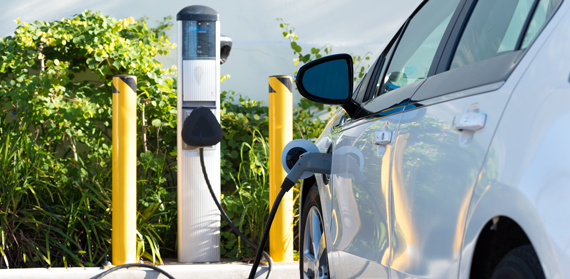Image: Shutterstock
Dr. Andrew Jones, Centre for Business in Society
By 2020, the UK government will have invested £600m in ultra-low emission vehicles (ULEVs) in an attempt to de-carbonise the transportation fleet as well as meet international targets for the reduction of emissions (DFT, 2016,). As part of this investment, UK policy has been geared towards offering consumers generous incentives to switch from conventionally powered internal combustion engine vehicles to a range of alternatively fuel-sourced vehicles including electric vehicles (EVs) powered by an all-electric drivetrain. These EV incentives include zero fuel or road taxation, a subsidy of up to £5,000 off the purchase price of a vehicle, plus investment in charging infrastructure (Graham-Rowe et al., 2012). However, adoption rates have been somewhat sluggish and the UK is forecast to miss its target of having 9% of the vehicle fleet made-up of electric technology by 2020 (Harvey, 2016). The investment in EV technology has included support for small demonstrator trials where motorists and businesses can adopt an EV for a defined period of time. Examples such as the Coventry and Birmingham Low Emission Demonstrators (CABLED) trial have provided valuable experiences for the use of ultra-low emission vehicles in urban locations, but the specific challenges of motorists in rural areas have often been overlooked.
In contrast to their urban counterparts, rural motorists and businesses face specific difficulties which impact upon their mobility choices. These users often face longer distances and to access key services and higher fuel costs than motorists would find in urban communities. Additionally, the shortage of public transport routes and the isolation of some rural locations have a direct impact on vehicle ownership and access. Irrespective of income this is often higher in rural areas when compared to urban communities (DFT, 2014). In an attempt to assist rural businesses in evaluating EV technology as a business solution, the Department for Environment and Rural Affairs (DEFRA) funded the Warwickshire Rural Electric Vehicle (WREV) trial between 2014 and 2016. WREV supported seventeen rural SMEs in Warwickshire, drawn from a variety of sectors, in adopting electric vehicles as part of their transport fleet for up to a two-year period. The trial provided grant support towards the lease of a Nissan Leaf, Nissan e-NV200 or BMW i3 and also assisted with the installation of a charge point. As part of this project Coventry University were responsible for monitoring user feedback and vehicle performance.
The in-depth findings from user experiences in WREV included qualitative and quantitative evidence and are particularly important for policymakers and local authorities. The vehicles were used extensively with 211,934 miles driven during the course of the trial and the Nissan users making a total of 35,814 trips. One user recorded 25,597 miles during their two-year involvement, whilst another drove 15,966 miles in a single year. The businesses involved in the trial used their vehicle for a variety of purposes, including deliveries, visiting clients, and transporting staff. The vehicles were used for mostly local travel which suited business requirements. Despite this heavy usage, many participants expressed ‘range anxieties’ due to a lack of confidence in the vehicle technology to deliver the required range:
“One staff member jumped in it the other day and it’s got 19 miles [of range left]. I said [to him] you’ve only got to go to Welford and back which is 6 miles. Once it starts dropping its range off, everybody gets the old ‘oh my god I can’t go anywhere’ [feeling]”
The range anxiety was not solely driven by confidence in the vehicle. Many participants found that the charging infrastructure in rural areas was insufficient, and more widely they believed that the charge points were being misused and were not reliable. This deterred them from making longer trips:
“I went to Shropshire the other day, I could have gone in this [EV] because they have got a CCS charger at Corley and they have got a CCS charger at Telford Services….We stopped at Corley anyway and there were two Mitsubishi hybrids…They’ll plug-in leave or they do not even plug-in, they just park at the electric car charging space. Basically they are blocking a charging point”
Therefore issues with charging are wider than simply increasing the quantity of charge points. The trial provides evidence to suggest that there needs to be improved maintenance and driving education in order to encourage more efficient usage of the system.
More positively, the EVs fitted into many of the SMEs organisational routines with most organisations reporting that the technology was accepted within the business. The SMEs were also found to have recorded savings on fuel expenditure as well as lowering emissions. One SME was able to save an estimated £3,226 on their fuel expenses, whilst some of the agriculture organisations involved in WREV used solar power to lower their energy costs and increase sustainability. Alongside these savings, some businesses generated more unexpected benefits:
“We were using a lot of agency staff, because for staff from Rugby, even though its only 6 miles [away], there are no buses….That means that we don’t need to use as many agency staff who are more expensive than our own staff. We have saved some money in that way”
In addition to these extra savings, other organisations noted that the EV became part of their marketing and promotional strategy:
“We used that [EV] in our business ethically ourselves, we were interested as part of our image and marketing leaflet to talk about using the electric vehicle to go to-and-from the kitchen”
To find out more about the WREV trial and electric vehicles, sign up for the ESRC Festival of Social Science event ‘Electric Vehicles: Solving the rural mobility challenge’ on 9th November 2016 from 9:30am to 3pm at Stareton Hall, Stoneleigh Park, Warwickshire, CV8 2LZ. More information about the event is available at http://www.greenwatt.co.uk/warwickshire-rural-electric-vehicle-project-wrev/wrev-seminar/
Research Team: Dr. Andrew Jones and Dr. Jason Begley




Comments are disabled